A long-anticipated milestone was reached Tuesday when the Bainbridge Island City Council approved the Climate Action Plan, culminating roughly three years of work by the city’s Climate Change Advisory Committee.
“This is rather historic,” Mayor Leslie Schneider said.”
The CAP, which was noted as the highest priority for the CCAC by the council this year, also received the highest number of votes in the 2021-22 budget priorities exercise conducted in March. The CAP includes strategies to move the city toward three goals:
- Mitigation – Reduce greenhouse gas emissions by 90% by 2045 compared with 2014 levels with interim milestones of 25% reduction by 2025 and 60% by 2035 compared to 2014 levels.
- Adaption – Bainbridge Island is climate savvy and can withstand the impacts of climate change.
- Community engagement – COBI inspires community action and partners with local and regional organizations to take meaningful and equitable climate change mitigation and adaptation actions.
CCAC chairman Michael Cox proposed that the council look at grant opportunities to help fund the CAP, including $65 million from the U.S. Department of Energy for Connected Communities and from the Volkswagen settlement, which Washington state has already received $91 million of the $141 million, leaving $50 million remaining.
Outgoing councilmember Kol Medina, a huge proponent of CAP, said he could have left the council earlier but wanted to stick around to witness the momentous occasion for the city of Bainbridge Island.
“It’s a tremendously amazing plan that you guys have brought forward,” Medina said. “I’m so proud of you all and our community.”
After approving the CAP, Medina left the council meeting and the council itself for the final time before leaving for his new position in Walla Walla.
The CCAC’s next steps involve some “immediate action items” consisting of a climate lens, an equity lens, hiring a climate change coordinator, greenhouse gas inventory, Puget Sound Energy franchise agreement, energy demand, Green Energy and Building Fund, Bainbridge Island fleet transition, an law to reduce single-use plastics, and web presence/outreach, according to the committee’s presentation.
Cox said he’s hopeful to roll out the CAP by January by hosting some community workshops with assistance from Climate and Energy Forum organizations.
“This is a top-notch city committee,” deputy mayor Joe Deets said. “Now we’re going to see how difficult change really is. I think we’re up to the challenge here on Bainbridge.”



